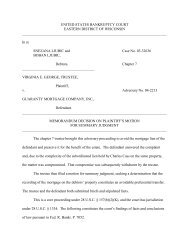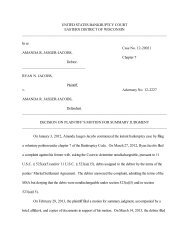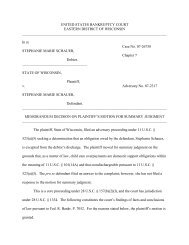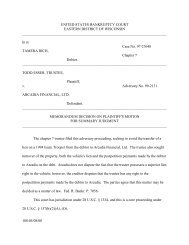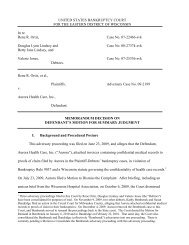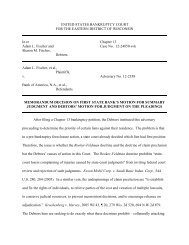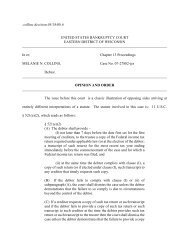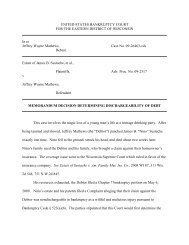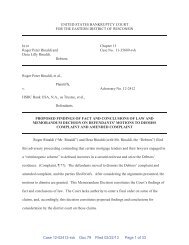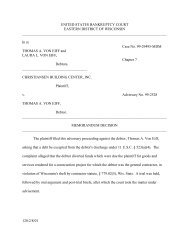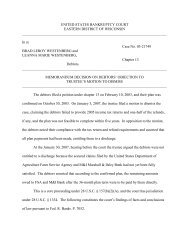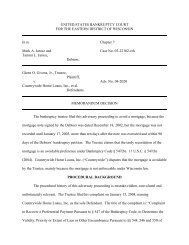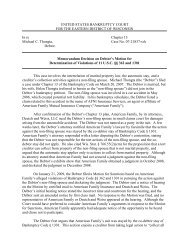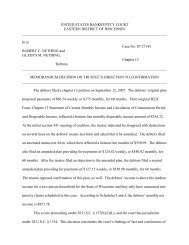In re Denise Harrison, Case No. 96-28304 - Eastern District of ...
In re Denise Harrison, Case No. 96-28304 - Eastern District of ...
In re Denise Harrison, Case No. 96-28304 - Eastern District of ...
Create successful ePaper yourself
Turn your PDF publications into a flip-book with our unique Google optimized e-Paper software.
UNITED STATES BANKRUPTCY COURT<br />
EASTERN DISTRICT OF WISCONSIN<br />
<strong>In</strong> <strong>re</strong><br />
DENISE KAY HARRISON,<br />
Debtor.<br />
Chapter 7<br />
<strong>Case</strong> <strong>No</strong>. <strong>96</strong>-<strong>28304</strong>-MDM<br />
MEMORANDUM DECISION ON DEBTOR’S MOTION FOR CONTEMPT<br />
AGAINST DISCOVER FINANCIAL SERVICES CARD<br />
INTRODUCTION<br />
The debtor filed a motion for finding <strong>of</strong> contempt against Discover Financial<br />
Services Card (Discover) for violating the permanent injunction under 11 U.S.C.<br />
§ 524(a)(2) by continuing collection activities with <strong>re</strong>spect to a p<strong>re</strong>petition debt.<br />
Discover opposed the motion and claimed that it was seeking to collect a postpetition<br />
debt. <strong>No</strong> adversary proceeding was ever commenced to determine whether the debt<br />
was otherwise nondischargeable. The <strong>re</strong>levant facts we<strong>re</strong> either stipulated to or part <strong>of</strong><br />
the <strong>of</strong>ficial court <strong>re</strong>cord.<br />
The debtor and her attorney signed a completed chapter 7 petition and<br />
schedules on October 8, 19<strong>96</strong>, and filed them on October 9, 19<strong>96</strong>, at 9:57 a.m. Also on<br />
th<br />
October 9 , the debtor endorsed and deposited a Discover “For Deposit Only” cash<br />
advance check for $750 at First Financial Bank. The check, which was dated<br />
th<br />
October 7 , was hono<strong>re</strong>d by G<strong>re</strong>enwood Trust Company, the Discover Card issuer, on<br />
th<br />
October 11 .<br />
The debtor contends that because she borrowed the money befo<strong>re</strong> her<br />
95:01/28/98
ankruptcy was filed, Discover violated the permanent injunction by continuing to seek<br />
payment <strong>of</strong> the debt. She appa<strong>re</strong>ntly considers writing the cash advance check to<br />
herself, and possibly the delivery <strong>of</strong> the check to her own bank, the event <strong>of</strong> borrowing.<br />
She points out that any other interp<strong>re</strong>tation <strong>of</strong> when the debt was incur<strong>re</strong>d would allow<br />
c<strong>re</strong>ditors to hold checks until after a bankruptcy to move their position from a p<strong>re</strong>petition<br />
to a postpetition debt.<br />
Discover, on the other hand, argues that the date a check is hono<strong>re</strong>d by the<br />
drawee determines whether it is a p<strong>re</strong>petition or postpetition debt. Thus, because the<br />
check was hono<strong>re</strong>d on October 11, 19<strong>96</strong>, two days after the debtor filed her bankruptcy<br />
petition, it is a postpetition debt and subject to full <strong>re</strong>covery without limitation by the<br />
discharge.<br />
DISCUSSION<br />
When a debtor is granted a discharge <strong>of</strong> debt, he or she is protected from<br />
c<strong>re</strong>ditors’ efforts to collect the debt from them personally by 11 U.S.C. § 524(a)(2).<br />
Under that provision, the discharge “operates as an injunction against the<br />
commencement or continuation <strong>of</strong> an action . . . or an act, to collect, <strong>re</strong>cover or <strong>of</strong>fset<br />
any such debt as a personal liability <strong>of</strong> the debtor . . . .” Willful violation <strong>of</strong> the injunction<br />
warrants the finding <strong>of</strong> contempt. <strong>In</strong> <strong>re</strong> Tor<strong>re</strong>s, 117 B.R. 379, 382 (N.D. Ill. 1990).<br />
Discover will only be found in contempt if it has continued to seek collection <strong>of</strong> a<br />
p<strong>re</strong>petition debt after it has knowledge that the debt is discharged.<br />
The Sup<strong>re</strong>me Court held in Barnhill v. Johnson, 503 U.S. 393, 399, 112 S.Ct.<br />
1386, 1390 (1992), that a transfer within the meaning <strong>of</strong> § 547(b) did not occur until the<br />
95:01/28/98 -2-
ank on which the check was drawn hono<strong>re</strong>d the check. The Court <strong>re</strong>asoned that<br />
“myriad events can intervene between delivery and p<strong>re</strong>sentment <strong>of</strong> the check that<br />
would <strong>re</strong>sult in the check being dishono<strong>re</strong>d.” Id. The rationale applied to determine<br />
whether a transfer occur<strong>re</strong>d within the p<strong>re</strong>fe<strong>re</strong>nce period will be applied to the instant<br />
fact situation to determine whether a transfer occur<strong>re</strong>d, and whether the debt arose,<br />
p<strong>re</strong>petition or postpetition.<br />
The debtor’s concern that the c<strong>re</strong>ditor <strong>of</strong> a cash advance could convert a<br />
p<strong>re</strong>petition debt into a postpetition debt is not well founded. Discover has no way <strong>of</strong><br />
knowing whether its customers will use their cash advance <strong>of</strong>fers and when they might<br />
do so. It has no way <strong>of</strong> knowing when a bankruptcy might occur, and the<strong>re</strong> is no<br />
evidence that it can or did alter <strong>re</strong>gular commercial banking channels. The customer<br />
accepts Discover’s <strong>of</strong>fer <strong>of</strong> additional c<strong>re</strong>dit by depositing a check, a highly <strong>re</strong>gulated<br />
procedu<strong>re</strong>. The check was hono<strong>re</strong>d by Discover’s bank two days after the debtor<br />
deposited it to her bank, well within normal standards.<br />
Because the drawee bank, G<strong>re</strong>enwood Trust Company, did not honor the<br />
th<br />
Discover check until October 11 , the transfer was postpetition. The<strong>re</strong>fo<strong>re</strong>, pursuant to<br />
the Barnhill analysis, Discover did not violate the discharge injunction by seeking to<br />
collect the debt.<br />
The debtor’s schedules may also shed some light on whether the cash advance<br />
was intended by the debtor to be a p<strong>re</strong>petition or postpetition debt. On Schedule F,<br />
C<strong>re</strong>ditors Holding Unsecu<strong>re</strong>d <strong>No</strong>npriority Claims, the debtor lists a “Discover” claim<br />
amount <strong>of</strong> $5,411. The consideration for the claim is noted as “c<strong>re</strong>dit card purchases,”<br />
and the date the claim was incur<strong>re</strong>d is “91-95.” Schedule F, Claim no. 2. The<strong>re</strong> a<strong>re</strong> no<br />
95:01/28/98 -3-
other Discover Card claims listed in the debtor’s schedules. Clearly, the debtor did not<br />
th<br />
include the October 9 cash advance, which is not a “c<strong>re</strong>dit card purchase,” on her<br />
schedules since the debt was incur<strong>re</strong>d after 1995.<br />
The parties have stipulated that the Discover check was deposited by the debtor<br />
in her bank account. Although the parties did not stipulate <strong>re</strong>garding which bank she<br />
deposited the check with, the court can only assume that it was at First Financial Bank,<br />
since that was the bank that posted the “For Deposit Only” check. The only bank<br />
account listed on the debtor’s schedules is $200 with Firstar Bank. Schedule B,<br />
Property no. 2. This account is claimed exempt. Schedule C. To be consistent with<br />
her cur<strong>re</strong>nt argument that she borrowed the money p<strong>re</strong>petition, she might alternatively<br />
have listed the check as a right to loan proceeds under Schedule B, Property no. 20,<br />
and likewise claimed it exempt. However, the debtor did not list the Discover cash<br />
advance as a debt, and she did not list the proceeds deposited to her account (but not<br />
collected from the drawee bank) as an asset. Amended schedules have never been<br />
filed.<br />
95:01/28/98 -4-
Consequently, the court finds that Discover’s continued collection activities with<br />
<strong>re</strong>spect to its postpetition debt did not violate the permanent injunction. The debtor’s<br />
motion for contempt is denied. A separate order will be ente<strong>re</strong>d.<br />
Dated at Milwaukee, Wisconsin, January 28, 1998.<br />
BY THE COURT:<br />
___________________________________<br />
Honorable Marga<strong>re</strong>t Dee McGarity<br />
United States Bankruptcy Judge<br />
95:01/28/98 -5-



